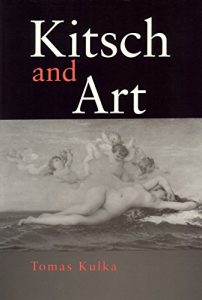What is kitsch? What is behind its appeal? More important, what is wrong with kitsch? Though central to our modern and postmodern culture, kitsch has not been seriously and comprehensively analyzed; its aesthetic worthlessness has been generally assumed but seldom explained. Kitsch and Art seeks to give this phenomenon its due by exploring the basis of artistic evaluation and aesthetic value judgments.
Tomas Kulka examines kitsch in the visual arts, literature, music, and architecture. To distinguish kitsch from art, Kulka proposes that kitsch depicts instantly identifiable, emotionally charged objects or themes, but that it does not substantially enrich our associations relating to the depicted objects or themes. He then addresses the deceptive nature of kitsch by examining the makeup of its artistic and aesthetic worthlessness. Ultimately Kulka argues that the mass appeal of kitsch cannot be regarded as aesthetic appeal, but that its analysis can illuminate the nature of art appreciation.






